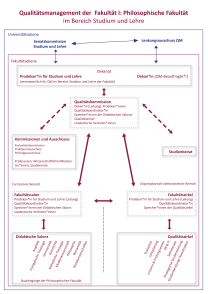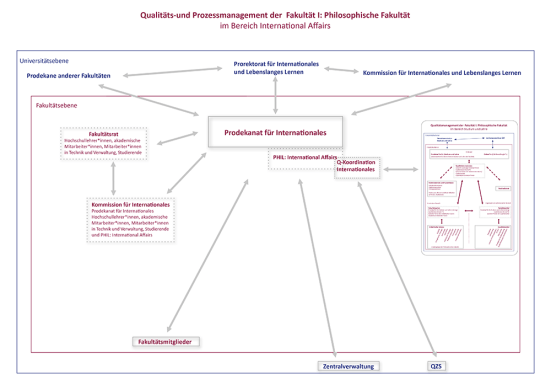Quality Management of the Faculty I: Faculty of Arts and Humanities
Study programs and study organization of Faculty I
Faculty I offers BA/MEd teacher training courses and subject-specific BA and MA study programs. The teaching degree program is regulated by a university-wide framework examination regulation (Rahmen-PO), the subject-specific degree programs (in short: subject-specific degree programs) of the Schools are regulated by a faculty-wide framework examination regulation (Rahmen-PO). The Framework Examination Regulations (Rahmen-PO) for the subject-specific degree programs provide for three study models that enable a wide range of subject combinations with different areas of specialization. The individual subjects for the teacher training and specialist degree programs are developed, supervised and offered by the corresponding seminars of Faculty I. The Center for Teacher Training and Educational Research at the University of Siegen is responsible for the organization and administration of the teacher training programs, while the Dean of Studies of the Schools is responsible for the subject-specific programs. Functional units that are responsible for organizational and administrative tasks in the Schools are, where possible, set up "across" the degree programs.
Quality Management System (QMS) of Faculty I

Faculty I relies on the discursive involvement of those involved in studying and teaching in the curricular and organizational-administrative areas as well as the students in quality assurance. Against the background of the fundamental distinction between curricular tasks on the one hand and organizational-administrative tasks on the other, the QMS of Faculty I is consistently divided into a curricular and an organizational-administrative area.
In the curricular area, the didactic salon of a seminar forms the quality assurance committee at subject level, in which the curricular communication and development processes regarding the study programs (subjects, courses) for which it is responsible take place, subject-related problems are identified and solution strategies are developed and pursued. The Didactic Salons each consist of all lecturers of a seminar and two student representatives; the members of a Didactic Salon elect a spokesperson from the lecturer members, who represents the Didactic Salon externally and is a member of the interdisciplinary Faculty Salon and the faculty-wide Quality Commission.
The Faculty Salon is the quality assurance body at faculty level in the curricular area. In addition to the speakers of the Didactic Salons, two student representatives, the Quality Coordinator and the Vice Dean for Studies and Teaching as chairperson are members of the Faculty Salon. If required, experts can be invited to the meetings of the Faculty Salon, which take place at least twice a semester. The Faculty Salon is a forum for interdisciplinary exchange on problems, tasks and goals in the individual subjects; the didactic salons determine which topics they bring to the Faculty Salon through their speakers. On the other hand, the Faculty Salon is a forum for discussing interdisciplinary problems, tasks and goals, strategies for tackling or pursuing them and university-wide developments. The speakers of the Didactic Salons can in turn be released from the Faculty Salon with information, suggestions or tasks that they bring to the Didactic Salons.
Quality assurance in the organizational-administrative area takes place in quality circles that have been formed for the individual functional units or areas. Specifically, there is one quality circle each in the areas of evaluation, curriculum planning, unisono & examinations, PR & IT, secretariats, strategic study planning and student advisory services & study coordination. The members of the individual Q-Circles are the employees of the respective units or areas, who elect a spokesperson. The task of the Q-Circles is to identify problems in the areas for which they are responsible, to develop and pursue solution strategies and to optimize processes. Members of other quality assurance committees and other experts can be invited to the meetings of the Q-circles as required. The spokespersons of the Q-Circles discuss cross-departmental problems in the Faculty Circle. The Faculty Circle is chaired by the Vice Dean for Studies and Teaching.
The spokespersons of the Didactic Salons and the Q-Circles are responsible for communicating information that is relevant to other quality assurance committees. At Schools level, quality-related issues and problems are discussed in the Quality Commission, which is made up of the spokespersons of the didactic salons and quality circles, the Q coordinator, the dean as chairperson, the vice deans of the Schools and three student representatives. The didactic salons and the quality circles can in turn introduce topics to the Q-Commission via their spokespersons, and the students can introduce topics via the student representatives. The Q-Commission usually meets once a semester and advises the Faculty Council on quality assurance issues. It can also provide information and impulses to the Faculty Salon, the Didactic Salons or the Q-Circles.
Quality management of the Faculty I: Faculty of Arts and Humanities in the area of research and young academics
Problems and needs in the area of research are usually submitted by students, faculty members or the central administration to the Vice Dean's Office for Research and Early Career Researchers or to the phil: Promotion of Early Career Researchers/PhD Advisory Service. Individual problems are solved in consultation with the Vice Dean's Office and individual faculty members.
In consultation with the Vice Dean's Office for Research and Early Career Researchers, faculty-wide relevant topics are submitted to the Research Commission, the Commission for the Promotion of Early Career Researchers and/or the Commission for the Maintenance of Academic Standards. The respective commissions present the respective needs and problems. Measures and proposals are discussed and recommended. Depending on the case in question, the result of the discussions is presented to the Faculty Council and, if necessary, a resolution is passed there. Applications for funding can be submitted to the Commission for the Promotion of Early Career Researchers or the Research Commission. Depending on the application, the Research Committee can make a recommendation to the Faculty Council, which then makes the necessary decisions.
Cross-faculty topics, problems and needs that cannot be solved within the Schools are brought to the attention of the Prorectorates for Research and Early Career Researchers and/or the Senate Commission for Research and Early Career Researchers via the Vice Dean's Office for Research and Early Career Researchers or in interface discussions with the respective Vice Deans of the other Schools. Alternatively, cross-university topics at an administrative level are also brought to the attention of the QZS via the Q Coordination.

Quality Management of the Faculty I: Faculty of Arts and Humanities in the area of International Affairs
Problems and needs relating to international affairs are usually reported by students, faculty members or the central administration to PHIL: International Affairs or to the Vice Dean's Office for International Affairs. Individual problems are solved in consultation with the Vice Dean's Office and individual faculty members.
Faculty-wide issues are brought to the International Affairs Committee in consultation with the Vice Dean's Office for International Affairs. The committee first presents the needs and problems (possibly using key figures etc.). Measures and proposals are then discussed and recommended. Depending on the case, the result of the deliberations is presented to the Faculty Council, where a decision is made. PHIL: International Affairs then implements the formulated measures promptly, convenes talks with other institutions (if necessary) and informs the Commission of the results in consultation with the Vice Dean's Office for International Affairs. In addition, regular interface discussions are held with the IO and other units of the central administration.
Cross-faculty topics, problems and needs that cannot be solved within the Schools are brought to the attention of the Prorectorates for International Affairs and/or the Senate Commission for International Affairs and Cooperation via the Vice Dean's Office for International Affairs and Lifelong Learning or are introduced into the interface discussions with the Vice Deans' Offices of the other Schools. Alternatively, cross-university topics at an administrative level are also brought to the attention of the QZS via the Q Coordination. Issues relating to teaching and learning are brought to the relevant communication circle via the Q Coordination. Information from the Prorectorates, university-wide strategies and framework conditions are fed back to the Schools via the Vice Dean's Office, and international contracts or applications for funding for study trips are also submitted to the Commission for International Affairs. This committee makes a recommendation to the Faculty Council, which passes the necessary resolutions.

Further information
The team of Q-coordinators of the Faculty I: Faculty of Arts and Humanities - Tina Karina Katz (Studies and Teaching), Dr. Luz Pacas (International Affairs), Dr. Mathias Scheicher (Research and Young Academics) - can be reached at qm@phil.uni-siegen.de.